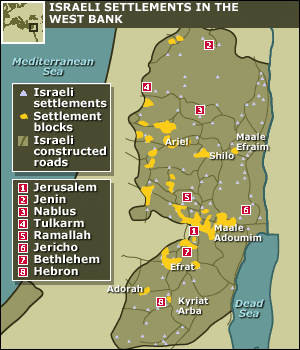
UN resolutions, the Oslo Agreement, and negotiations over Israeli withdrawal from Palestinian territories occupied in 1967 have all been replaced by buzzwords, such as, "settlement freeze" and "confidence-building measures." Israel's Prime Minister Benjamin Netanyahu has skillfully managed to get the international community spinning its wheels over issues that have been dealt with decades ago. During a recent press conference with Angela Merkel, the German chancellor has urged Israel to stop settlement construction in the occupied Palestinian territories and resume the Middle East peace process.
"I made clear that the Federal Republic of Germany believes that progress on the issue of settlement building, a stop to settlement building, is an important building block and a condition for re-launching the Middle East peace process," she said.

Her comments came after Netanyahu held talks with George Mitchell, the US Middle East envoy, amid tension between Washington and Israel over the issue of settlements. Israel's ever-expanding network of settlements in the occupied territories is viewed by many members of the international community as the most significant obstacle to the creation of a viable, sovereign Palestinian state. The "settlement freeze" idea was born in 1977 after the Camp David Summit; in a letter to President Jimmy Carter, then Prime Minister Menachem Begin offered a three month moratorium on establishing new settlements rather than the longer moratorium preferred by Washington. The freeze idea was also raised by President George H. W. Bush without success in the context of a U.S. agreement to provide loan guarantees to Israel in the early 90s. The idea was also prominent among the confidence-building measures sought by Palestinians before and after the Madrid conference in 1991.
The "freeze" was also reiterated by the Clinton administration but was watered down when the provision for "natural growth" was added to it. The saga continued under George W. Bush and lest we forget, it was George Mitchell who was dispatched to the region in 2001 to discuss "settlement freeze" and evacuation recommendations by the Sharm el-Sheikh Fact-Finding Committee (Mitchell Committee) which has called for the cessation of all settlement activity as a key element in constructing a viable diplomatic process.
The saga continues again, George Mitchell is back, and we now hear that "Israel and the United States are closing the gaps over the contentious issue of West Bank settlement construction", according to what senior American officials who are intimately involved in the matter recently told the Israeli Haaretz newspaper.
Meanwhile, Prime Minister Benjamin Netanyahu has resisted U.S. and international calls for a total freeze on construction, arguing that the Bush administration had acquiesced to continued Israeli settlement activity in large blocs that are likely to be annexed by Israel in any future agreement with the Palestinians. Mr. Netanyahu has also been peddling half-baked truths about the status of Jewish settlements and the squeezing of Palestinian Jerusalemites.
"Our policy is that Jerusalem residents can purchase apartments anywhere in the city," he said in July. "There is no ban on Arabs buying apartments in the west of the city, and there is no ban on Jews building or buying in the city's east."
What Mr. Netanyahu failed to mention is the fact that almost all land inside Israel's 1948 borders, including West Jerusalem, has been registered as "state land" managed by a body known as the Israel Lands Authority, which does not sell to Palestinians, especially residents of East Jerusalem who do not hold Israeli citizenship. But then again, Mr. Netanyahu continues his delay tactics following in the footsteps of his mentor the former Prime Minister Itzhak Shamir who, shortly after the Madrid conference, admitted that he had intended to play delaying tactics at the negotiating table for 10 years, while accelerating settlement-building and accomplishing facts on the ground, thus creating an irreversible situation that even the peace process would not overcome...his words cannot be more true today. Are we in for another round of ten-year delay tactics talking about "settlement freeze?"
